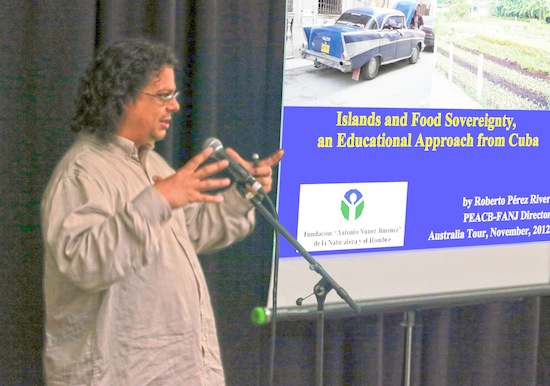There are things we in Tasmania can learn from the struggle for survival in Cuba. [20 November 2011 | Peter Boyer]

At the 2012 Sustainable Living Expo in Hobart, Roberto Pérez puts his case for the simpler life.
Cuba is a four-letter word. Like many such words it carries a lot more weight than its literal meaning.
We know Cuba as a large Caribbean island south of Florida, where people of European, African and indigenous descent speak Spanish and play some fine music. We also know it as the fiefdom for nearly half a century of Fidel Castro and, more recently, his brother Raoul.
For most Americans, the word signifies an objectionable political culture that ended the Havana high life for US tourists and crime bosses. That pleasant diversion disappeared in the 1960s as Castro rejected US capitalism. The US countered with a trade ban that’s still in place today.
Cuba is on America’s doorstep, but it’s a long way from here, and when it comes to socialist systems Australians aren’t so ideological as our friends in Washington. We led America, for instance, in making up with communist Vietnam.
Australia recognised the Castro government in 1989, and since 1996 has voted in the United Nations for the US to end its trade embargo. In recent years Cuba and Australia have exchanged ministerial visits. But on the whole we remain poorly informed about the country and its culture.
For 30 years Cuba used massive Soviet subsidies to stave off the effects of the US trade ban, but its economy crashed when the Soviet empire vanished in 1991. The Castro regime was forced to look for alternative economic models for a country facing complete ruin.
The regime still struggles to find ways to introduce market economics into its system of state socialism. Its dirt-poor people remain torn between a much-valued universal health and education system and the glittering prize of American money that beckons them over the Florida Straits.
Out of this potpourri of conflicting ideas and emotions, and into our own island, has come Roberto Pérez, an environmental biologist brimming with optimism and ideas about how a small island nation like Cuba can build a viable, sustainable economy in a world hooked on massive growth.
Pérez, whose time these days is spent developing and spruiking his country’s environmental sustainability and its home-grown techniques of low-impact food production, was a guest speaker at this month’s Sustainable Living Expo in Hobart.
Much of what he said resonates strongly in our own island community, a pioneer in environmental thinking. As Pérez was keen to point out, it was Tasmania that gave rise to the potent idea of permaculture, the basis of much of his own country’s current revolution in food production.
Pérez’s recipe for Cuba’s salvation rests heavily on conserving and living within natural ecosystems. The island’s forest cover was down to less than 15 per cent by the mid-20th century, but is now nearly double that, with an ultimate goal of 35 per cent cover.
Badly managed collective farms and over-use of pesticides during the Soviet era left the island’s farmland severely degraded, with river systems polluted and soil productivity lost through erosion, high acid levels, surface salinity and low levels of organic material.
With scientists predicting that a warming climate will limit Cuba’s water availability while increasing hurricane intensity and coastal vulnerability, environmentalists like Pérez are faced with big challenges in their efforts to rebuild the island’s agricultural capacity.
To do this, they’ve sought to avoid repeating past errors, such as large-scale, chemical-based approaches, choosing instead community-based structures and organic techniques.
Their efforts have resulted in much reduced levels of pesticide use — about 4 per cent that of the Soviet era — and seed management regimes that emphasise species diversity and local control.
A land reform program started in 2011 has released public lands for small farms, limited to 27-hectare lots. With a government supported education program, these farmers are learning non-chemical, natural techniques, including the use of permaculture, to improve soil productivity.
In cities and towns, 300,000 hectares have been given over to “agro-ecology”: food production on vacant urban land mixed with some restored natural elements. Cuba’s 384,000 urban agriculturalists cover all bases: professional and artisan, men and women, young and old.
Let’s not get ahead of ourselves here. Tasmania is not Cuba. We start with a much more productive farm sector, better roads, transport and equipment, and access to financial resources that Cuba can only dream of.
We also have to contend with established farm practices, corporate operators and suppliers, and other things that don’t concern socialist Cuba. But there’s much we can learn from that other island
Financial and infrastructure resources will get us only so far. We have to learn to manage, as Cuba has, with less of the things we’ve come to rely on, things like oil-based fertilisers, pesticides and cheap petrol and diesel.
We are yet to face the kinds of challenges that Cubans, for years teetering on the brink of an economic precipice, have long taken for granted. Cubans have had to pull together and improvise in order to feed themselves and build a sustainable long-term economy.
One day, we may have to do the same.
• Next year a two-week certificate course in permaculture at the University of Tasmania in Hobart, from 20 April to 3 May, will focus on putting permaculture skills to work in a city environment. For more information call (02) 63737763 or go to Milkwood Permaculture.
